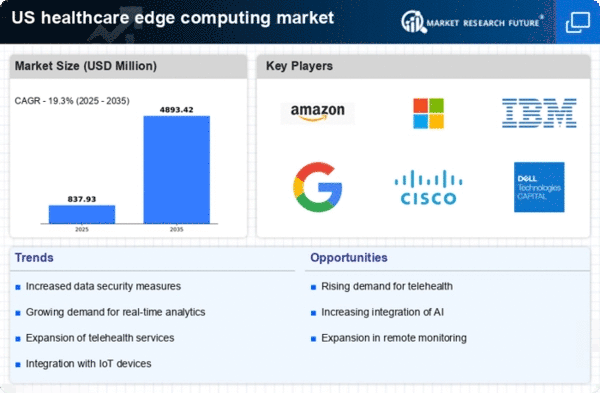Emergence of Personalized Medicine
The healthcare edge-computing market is being shaped by the emergence of personalized medicine. This approach emphasizes tailored treatment plans based on individual patient data.. This approach necessitates the collection and analysis of large datasets, including genetic information and lifestyle factors. Edge-computing solutions can facilitate the rapid processing of this data, enabling healthcare providers to deliver more precise and effective treatments. The personalized medicine market is projected to grow at a CAGR of 20% over the next several years, highlighting the increasing importance of data-driven decision-making in healthcare. As a result, the healthcare edge-computing market is likely to see heightened demand for technologies that support the integration and analysis of diverse patient data, ultimately enhancing the quality of care.
Growing Focus on Telehealth Services
the healthcare edge-computing market is driven by the expanding focus on telehealth services.. As healthcare providers increasingly adopt remote patient monitoring and virtual consultations, the demand for edge-computing solutions that can support these services is rising. Telehealth has become a critical component of healthcare delivery, allowing for continuous patient engagement and monitoring. The market for telehealth services is expected to reach $250 billion by 2025, indicating a substantial opportunity for edge-computing technologies that can enhance connectivity and data processing at the point of care. This trend suggests that healthcare organizations are prioritizing investments in edge-computing infrastructure to ensure seamless telehealth experiences, thereby driving growth in the healthcare edge-computing market.
Rising Demand for Real-Time Data Processing
The healthcare edge-computing market is experiencing a notable surge in demand for real-time data processing capabilities. This trend is largely driven by the increasing need for timely decision-making in clinical settings. Healthcare providers are seeking solutions that enable immediate access to patient data, which can enhance treatment outcomes. According to recent estimates, the market for real-time data processing in healthcare is projected to grow at a CAGR of approximately 25% over the next five years. This growth is indicative of the healthcare industry's shift towards more agile and responsive systems, which are essential for improving patient care and operational efficiency. As a result, the healthcare edge-computing market is expected to see significant investments in technologies that facilitate real-time analytics and data management..
Advancements in Wearable Health Technologies
the healthcare edge-computing market is experiencing growth due to advancements in wearable health technologies.. These devices, which monitor various health metrics in real-time, generate vast amounts of data that require efficient processing and analysis. Edge-computing solutions are particularly well-suited for this purpose, as they can process data closer to the source, reducing latency and improving response times. The wearable health technology market is expected to reach $60 billion by 2025, indicating a robust demand for edge-computing capabilities that can support these innovations. As healthcare providers increasingly leverage wearables for patient monitoring, the healthcare edge-computing market is likely to expand in tandem, driven by the need for effective data management and analysis.
Increased Regulatory Compliance Requirements
The healthcare edge-computing market is significantly influenced by the increasing regulatory compliance requirements. These requirements are imposed on healthcare organizations.. Regulations such as HIPAA necessitate stringent data protection measures, which in turn drive the adoption of edge-computing solutions that can enhance data security and privacy. Organizations are compelled to invest in technologies that not only comply with these regulations but also improve operational efficiencies. The market for compliance-related technologies is projected to grow by 15% annually, reflecting the urgency for healthcare providers to align with regulatory standards. Consequently, the healthcare edge-computing market is likely to benefit from this trend as organizations seek to implement compliant solutions that safeguard sensitive patient information.

















